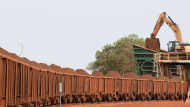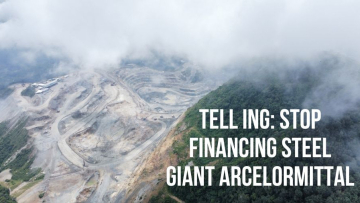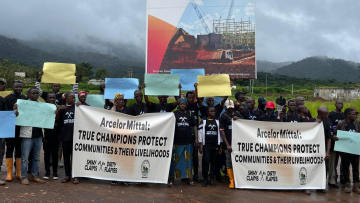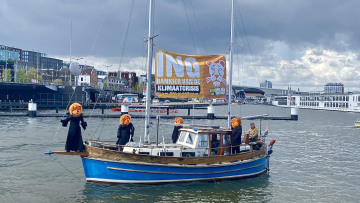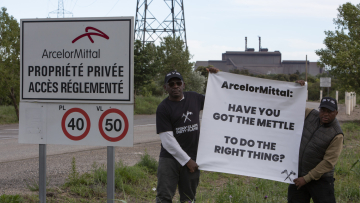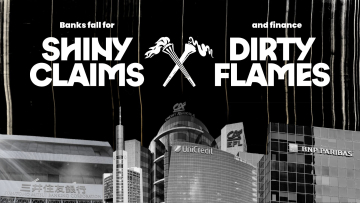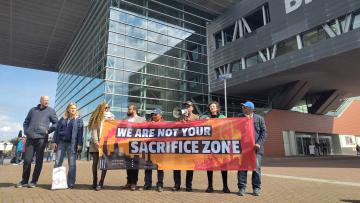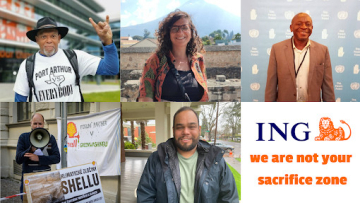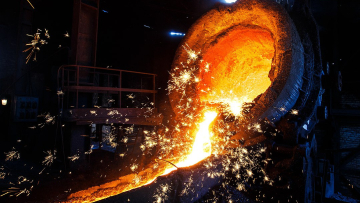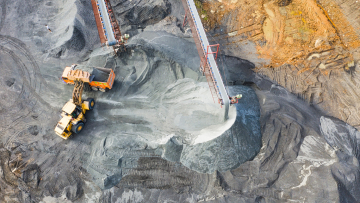
Company – On record
This profile is no longer actively maintained, with the information now possibly out of date
Company – On record
This profile is no longer actively maintained, with the information now possibly out of dateWhy this profile?
ArcelorMittal is the world’s second largest steel producer. Its coal-based operations emit enormous amounts of CO2 and pollution, creating adverse health effects for steel workers and proximate communities. Despite having announced a net-zero by 2050 target, ArcelorMittal champions ineffective, coal-perpetuating solutions such as Carbon Capture Utilisation and Storage (CCUS) and biomass, and has announced plans to build new blast furnaces in India, the most polluting type of steel plant.
What must happen
Banks should require ArcelorMittal to fully decarbonise its production process and to not open new, or extend the lifetime of existing coal-based steel plants, regardless of location, while respecting human rights and Indigenous rights in particular. They should make future financing conditional upon the achievement of these objectives.
In addition, banks should urge ArcelorMittal not to rely on unproven technologies such as carbon capture utilisation and storage (CCUS). Rather, banks should finance fossil-free production technologies, like electric arc furnaces, and green hydrogen based Direct Reduced Iron (DRI) facilities. If green hydrogen is not initially available in the location of the plant, financiers should require a detailed transition timeline.
| Sectors | Iron and Steel Manufacturing , Coal Mining, Mining |
| Headquarters |
|
| Ownership |
listed on Luxembourg Stock Exchange
The Mittal Lakshmi Niwas Family are the largest shareholders, and own 38.75% of the shares. |
| Subsidiaries |
|
| Website | https://corporate.arcelormittal.com/ |
ArcelorMittal is a Luxembourg-based company and the world’s second largest producer of steel. In 2021 it produced 69,061 million tonnes of steel, emitting 160.3 million tonnes of CO2. It currently operates 31 steel plants globally, and 81% of its production capacity is coal-based. 30% of its crude steel is produced in the Americas, 53% is produced in Europe and the remaining 17% produced in Ukraine, South Africa and Kazakhstan. In addition to steel production, ArcelorMittal operates 12 iron ore mines globally, and one metallurgic coal mine in Kazakhstan. Despite having announced a target to be net-zero by 2050, ArcelorMittal is building new coal-based blast furnaces in India, and is thought to be considering others in Mexico and Brazil.
Impact on human rights and communities
Health impact of air pollution ArcelorMittal has been sued for breaching air pollution laws in Bosnia and Herzegovina (2016), France (2022), India (2021), Kazakhstan (2018), South Africa (2019), and the United States (2015). In each of these cases, local populations suffered adverse health effects such as asthma, pulmonary cancer and premature fatalities; brought on by particulate matter and sulphur dioxide emissions from an ArcelorMittal steel plant. In many of the cases, the air and water pollution has led to crop failure, sick livestock, and local produce being unfit for human consumption. In March 2023, French reporting outfit Disclose found that ArcelorMittal’s french plant is exceeding air pollution limits and misrepresenting its emissions numbers. In the town of Taranto in Southern Italy, a 2021 World Health Organisation report found that ArcelorMittal’s Ilva plant has caused premature mortality and irreversible damage to local inhabitants' health.
Threatening Indigenous livelihoods Together with Baffinland Iron Mines Corporation, ArcelorMittal owns the Mary River iron ore mine in the north Qikiqtaaluk (North Baffin) region in Canada. Since the mine opened in 2014, there has been a significant decrease in wildlife, compromising the food security of the native Nuluujaat population. Despite protests from the Nuluujaat and activists acting in solidarity in Luxembourg, ArcelorMittal and Baffinland have announced plans to expand the mine, which would further endanger the narwhal seal populations on which the Nuluujaat depend.
Fatal working conditions Five workers were killed in a methane explosion in the Abayskaya coal mine in Kazakhstan in June 2022. In the same month, an investigation by state industrial safety inspectors found 200 industrial safety violations at the mine. Between its steel mill and coal mine operations, there have been estimated 100 deaths at ArcelorMittal mines in Kazakhstan since 2006. Negligence and faulty inspections or reporting has resulted in fatal working conditions for mine and steel plant workers.
Deaths of human rights defenders The Peña Colorada iron-ore mine in Mexico is a joint venture between ArcelorMittal and Ternium. Since the mine began operations in the 1970s, there have been several instances of murder and the disappearance of local activists. In April 2021, an Indigenous activist, lawyer and politician named José Santos Isaac Chávez was found dead, with evidence of torture. He was a fierce opponent of the mine continuing operations in the area. While there is no evidence that ArcelorMittal and Ternium have procured the death of any human rights defenders, independent investigators have been denied entry onto the operating site by ArcelorMittal and Ternium, creating a hostile and intransparent environment.
Failure to pay millions in sustainable development funds When ArcelorMittal began operations in Liberia in 2005, it signed Liberia’s Mineral Development Agreement (MDA). An amendment to the agreement signed into action in 2007 stipulated that ArcelorMittal will build hospitals, schools, and reinvest a proportion of its profits back into the community. As of 2021, ArcelorMittal has not implemented the agreement, leading to protests by affected communities and legislative action to prevent the new MDA from being renewed. As of August 2023, a new MDA has not been negotiated between ArcelorMittal and the Liberian government.
Impact on climate
High carbon emissions ArcelorMittal is the world’s second largest steel producer and 81% of its portfolio is coal-based production. In 2020, it disclosed that its global metal and mining operations emitted 160.3 million tonnes of CO2. That is more than the emissions of entire countries such as the Philippines or the Netherlands. The total warming potential of ArcelorMittal’s operations is higher, as this figure does not include methane emissions from the company’s coal mines, or from its operations in the United States and Italy. At present, there is no accounting or mitigation strategy underway for ArcelorMittal’s coal mine methane.
Unserious climate commitments ArcelorMittal has announced a net-zero by 2050 target. However its recent joint-venture with Nippon Steel to build a new coal-based steel plant in India suggests that it is not serious about this target. To remain under 1.5°C, no new coal-based steel plants should come online after 2025, unless using carbon capture utilisation and storage. The plant in India will come online in 2025-2026, without carbon capture.
Reliant on unproven net-zero technology To reach its net-zero targets, ArcelorMittal has opted in part for carbon capture utilisation and storage (CCUS), starting with its plant in Belgium. CCUS has a history of underperforming in similarly “hard-to-abate” sectors, and further perpetuates coal-based steel production when alternative production routes exist. With no commercial scale CCUS steel plants operating globally, ArcelorMittal is unlikely to meet its net-zero by 2050 target using CCUS. As another decarbonisation strategy, ArcelorMittal has championed replacing coal with biomass. As a solution for industry decarbonisation, biomass puts severe pressure on natural resources, and does not achieve meaningful net reductions in emissions.
Lobbying to weaken climate policy In its climate policy engagement rating, InfluenceMap has given ArcelorMittal a “D+” rating score. While often publicly making climate-positive statements, behind the scenes ArcelorMittal has lobbied to weaken EU-level climate legislation such as the Carbon Border Tax mechanism and the Emissions Trading Scheme.
Impact on nature and environment
Water pollution Governments and civil society organisations in Canada, France, India, Liberia, Ukraine, and the United States have filed lawsuits against ArcelorMittal for dumping toxic waste into water sources. The illegal disposal of the toxic by-products of iron ore mining and steel production has polluted groundwater sources, killed fish populations, and compromised delicate ecosystems.
The banks listed below provided credit (through loans and bonds underwriting) to ArcelorMittal and/or its subsidiaries between 2016 and 2022. For a list of ArcelorMittal's shareholders see here.
2024
2024-11-26 00:00:00 | ArcelorMittal announces yet another delay to its decarbonization pledge
ArcelorMittal, Europe’s largest steelmaker is further delaying its decarbonization pledge, by delaying five of it's fossil-free steel projects across Spain, France, Belgium and Germany. ArcelorMittal has pledged to transition away from coal towards climate-compatible steel production processes and has already secured €3 billion in public aid to do so. Yet, now it’s holding back on delivering. See ArcelorMittal's press release here.


